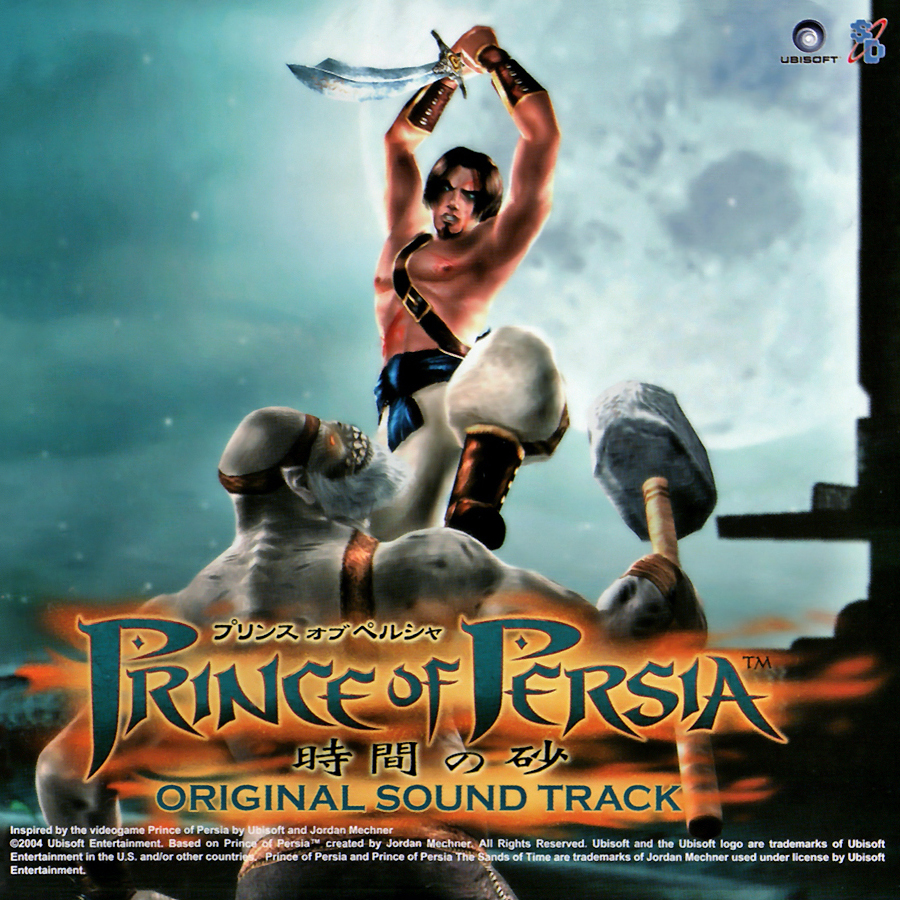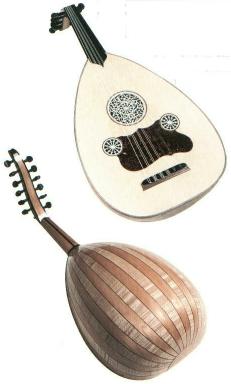Last updated on November 5, 2012
Japanese album cover, because there never was a Western release in physical form (that should surprise literally no one when it comes to video game music).
What’s great about The Sands of Time, really, is the excallent atmosphere it thrusts upon the player in nearly every aspect. One is supposed to recall a story-book vision of Persia and the Arabian world, where everybody has a slight English accent for some reason (this is even in the movie!) and we have regal, proper emperors of the East waging war against each other. Heck, there’s even an evil vizier who looks nothing less than evil. The strokes are broad and simple, but never dull. The soundtrack, as well, contains strains of this idealized world throughout.
It’s no surprise they picked Stuart Chatwood, bassist and keyboardist of The Tea Party (forever to be confused with a political movement in America’s history in the late 1700s or in the last four years). Indie darlings of Canada, they were known for a fusion of Eastern and Western styles to create “Moroccan roll”, a fun play on words AND an apt description of their style. Listen to “Bazaar” and you’ll hear their odd mixture with Jim Morrison-like vocals (seriously, the vocalist does make it sound like the Doors, doesn’t he?):
Ubisoft, in effect, picked the perfectly person (alliteration ahoy) to compose the music for this game. Granted, there isn’t a huge lot of it, but Chatwood certainly knew what he was doing when composing the music. He was aided in this process by – gasp! -a real Iranian composer, Ali Tajvidi, as well as Iranian violinist Bijan Mortazavi. To augment the sound, Ubisoft also hired oud band Le Trio Joubran. Now, for those who don’t know what an oud is, you’ve definitely see it in someplace or another by virtue of watching movies. Allow me to demonstrate:
You can’t seriously tell me you’ve never seen this thing before. Right? Well, it’s a rather amazing instrument that’s used throughout the game – it IS the Middle Eastern sound, at least in the mind of pop culture. Here, take a look:
Showing Chatwood’s affinity for bass guitar, we also see the prominent influence of the oud bands right underneath. They create an ethereal atmospheric tone – and this is for battle sequences, for goodness sake! The vocals of Maryem Tollar pile on the tone that this isn’t your ordinary game music. I’m glad Chatwood didn’t take the easy way out on this one – you could have gone for the most generic themes imaginable in this kind of game, but he keeps it as authentic as possible throughout. That doesn’t mean you don’t see the rock and roll influence on Chatwood’s own work, as in Prelude Fight:
This piece works entirely off its rockin’ guitar line with such elements strewn about in the background. Chatwood has a good handle on his own proclivities – although he allows himself some indulgences, I don’t find it entirely unlistenable outside the game. Unlike Warrior Within, which takes the rock vibe, turns it into metal and keep its base influences out of the picture, he allows them to flower and bloom into new developed forms through. There’s a thematic line weaving through the entire game and and the music represents that same evolution. Take ‘Enter the Royal Palace” – it actually combines the Prelude Fight Theme with more instrumentation and vocals throughout:
This seems slow paced, but the music continues to crescendo and increase in intensity, even if that intensity comes in brooding moments with prominent guitars like in “The Royal Baths”
I should note that most of this music works in the battle sequences – other than incidental cutscenes and the like, most platforming in the game only comes with ambient noise and silence of a once-living, yet now dead community. It’s effectively eerie, making the battle music stand out in the grand scheme of the game. It’s also notable that as the Prince and Farah’s relationship develops, the female voice becomes more and more prominent in the music. Eventually, it becomes the driving force in the melody, intentionally so by my recokining – it’s too subtle not to be, though perhaps I’m reading into it too much. Take ‘The Library”, and then compare to “The Tower of Dawn” (my personal favorite):
These make the final moments all the more affecting (though I hesitate to spoil it – plenty of people haven’t played it, so here’s my recommendation: play it now!). It concludes its musical themes in much the same way as it began, returning to the overly muted Persian thematic. Jesper Kyd obviously got some inspiration from this in putting together Assassin’s Creed, although lending itself to a more muted musical styling than Prince of Persia’s obvious influences. It’s quite a soundtrack, I’d say, It’s not traditionally “listenable” in the vein of a Final Fantasy soundtrack. That’s true of all video games, however – disassociating the music itself from the game, the feelings and triumphs it engenders, and the whole experience never quite works. There’s a power in music that fits with the entire aesthetic appearance.
Even in the Bible, music has real power. Take this story, for example, from:1 Samuel 16:14-23:
14 Now the Spirit of the Lord departed from Saul, and an evil spirit from the Lord terrorized him. 15 Saul’s servants then said to him, “Behold now, an evil spirit from God is terrorizing you. 16 Let our lord now command your servants who are before you. Let them seek a man who is a skillful player on the harp; and it shall come about when the evil spirit from God is on you, that he shall play the harp with his hand, and you will be well.” 17 So Saul said to his servants, “Provide for me now a man who can play well and bring him to me.” 18 Then one of the young men said, “Behold, I have seen a son of Jesse the Bethlehemite who is a skillful musician, a mighty man of valor, a warrior, one prudent in speech, and a handsome man; and the Lord is with him.” 19 So Saul sent messengers to Jesse and said, “Send me your son David who is with the flock.” 20 Jesse took a donkey loaded with bread and a jug of wine and a young goat, and sent them to Saul by David his son. 21 Then David came to Saul and attended him; and Saul loved him greatly, and he became his armor bearer. 22 Saul sent to Jesse, saying, “Let David now stand before me, for he has found favor in my sight.” 23 So it came about whenever the evil spirit from God came to Saul, David would take the harp and play it with his hand; and Saul would be refreshed and be well, and the evil spirit would depart from him.
Music has true power, to transport into worlds and to praise God. Games without music were anemic; with it, they’ve turned into a genre of their own adored by millions today and growing. That’s quite a tool, and Stuart Chatwood’s soundtrack shows the power of music to make a simple story all the more effective.



 Discover the Royal Chambers
Discover the Royal Chambers